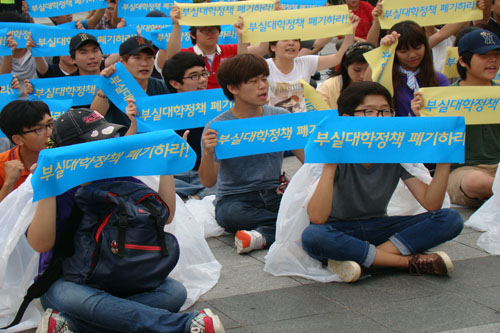CNU promulgated a revised school regulatrion to abolish it on August 24th.
<#320 News Focus>
The Abolition of DPES: Who Is It For?
By Kim Hyun-kyung, Tribune Reporter
On the 23rd of May, Chonnam National University (CNU) held its 19th University Presidential Elections. As a result, Park Chang-soo (Professor, CNU Medical School) was chosen as the first priority presidential-appointment nominee. His term as a president would have started on the 17th of August, but Professor Park was under the prosecutor’s investigation over allegations of illegal campaigning. He allegedly offered some meals to co-workers during the election period which is prohibited according to the Public Educational Officials Act. Prof. Park mostly admitted his conduct and withdrew from the presidential appointment on the 13th of July. With this, CNU encountered its worst 60th anniversary with the withdrawing of the presidential appointed nominee. Along with Prof. Park’s withdrawal, the second in line to the president Lee Byung-taek appeared on the line of police investigation as well. This incident brought up the side-effects of the Direct Presidential Election System (DPES). With these DPES’s side-effects, the Ministry of Education and Science and Technology (MEST) caused controversy over whether to abolish this system or not.

What Is DPES?
DPES is an election process by which the president of the university is elected by the university members including professors, administrative staff, and students firsthand. CNU first started to use this system since 1988 with the burning democratization of Gwangju students. In those days, CNU selected this system to prevent the harmful effects from unilaterally appointing the president by government and private school foundations. However, with the system causing adverse effects, MEST is putting pressure on abrogating this. Until recently Chonbuk National University and Kyungbuk National University decided to repeal this system. Now is it really instigating arguments about DPES? Related to electing presidents, members can reflect upon their opinions. Since the system helps to elect the university president democratically, it naturally installs brakes on dogmatically managing the university by the president. Some national universities adhere to DPES asserted university’s right to enhance its autonomy without state interference. Some people believe that it is better to choose DPES rather than the abolishing of DPES. An anonymous professor said that the advantage of selecting this system is that the candidates can make an effort on how to manage the university. By studying this, they can get a grip on the realities of university management. However, politics should not meddle in the media and education to not infringe upon the autonomy of the university.
Pressured by MEST?
MEST is applying pressure on abolishing DPES. They insist that DPES destroys the pure research atmosphere of the university. Furthermore, with the overheating of the presidential election, the faculty is divided into the candidate’s schools of origin and regions. Other than forming a clique, mutual abuse, money and valuables dealing can be pressed into service which comes down to conflict amongst the professors. MEST is rendering reasons to abolish DPES inwardly. In Education Capability Reinforcement, MEST put the DPES item into evaluation. With the low score in this sector, CNU was named as a ‘poor university’ because of the diverted attention of the faculty due to the DPES. It has been over 4 years since CNU was included in this protocol. But, last April, CNU was ruled out and lost 50 hundred million won worth of budget. Until the 2nd of August, the online voting was carried on to disseminate information to the faculty about the reality of the DPES. It came out that 70.1% of the voters agreed on continuing DPES. In addition, the General Student Council of CNU’s objection on abolishing the DPES should be considered as well. Contended on suspending procedure in abolishing the system, the GSC gathered around the Administration Building of CNU on 13th of August to protest, and also visited Seoul to protest against MEST on August 21st. However, the university promulgated a revised school regulation to abolish the DPES on August 24th, so it is caught up in controversy repeatedly.
What Is Going on at CNU?
Kim Yoon-soo termed out as the University President on August 16th. From 17th, Song Kyung-an, Dean of Academic Affairs, is acting as president. The new president should be selected within 50 days after August 29th. In its 60th Anniversary, CNU has experienced hardship from the presidential election scandal and the controversy on discontinuing the Direct Presidential Election System. CNU has gained lots of attention from other universities. As it was said before, if CNU cannot elect one person within 50 days, the one to be recommended as the 19th President of CNU will be from the government. In order for this not to happen, CNU has to listen to other opinions intensively and gather the opinions from everyone to elect the president that most members of CNU—students, faculty and even the government—agree with.
김현경 기자
iloveseunggi@nate.com

